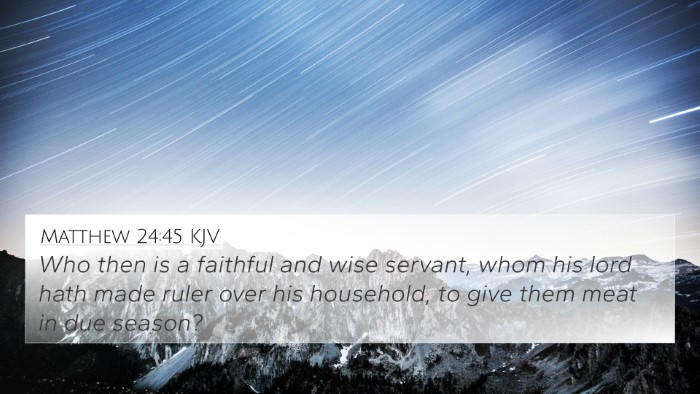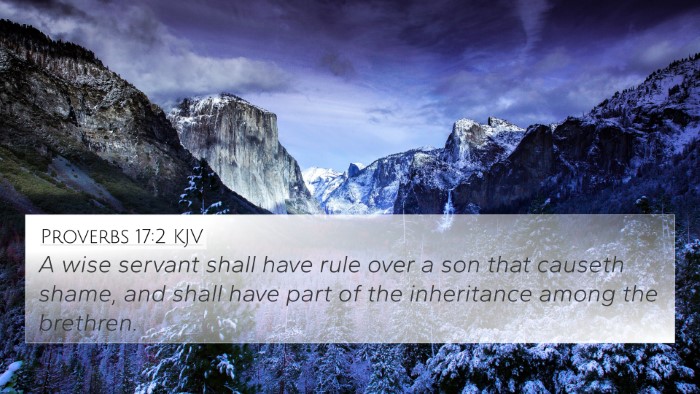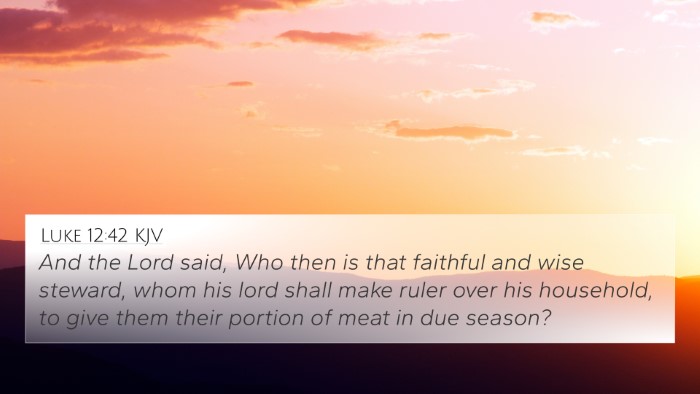Understanding Proverbs 14:35
Proverbs 14:35 states, "The king's favor is toward a wise servant, but his wrath is against him who causes shame." This verse highlights the relationship between a ruler and his servants, emphasizing the significance of wisdom and integrity in one's service.
Meaning of Proverbs 14:35
In examining this verse, various public domain commentaries provide rich insights:
- Matthew Henry: Henry emphasizes that the favor of a king can lead to prosperity for a wise servant. He points out the importance of being wise, as it not only pleases the king but brings about good outcomes. However, folly or shameful conduct leads to disfavor and potential consequences.
- Albert Barnes: Barnes elaborates on the idea that in any governance, the relationship between the ruler and the servant is essential. A wise servant secures the king's favor through diligence and wisdom, which ultimately leads to promotion. Conversely, shameful behavior results in the king's wrath, affecting the servant's standing and future.
- Adam Clarke: Clarke's commentary highlights that the concept of a king's favor is a reward for wisdom. Clarke notes that wise counsel and actions can placate a ruler, whereas disgraceful behavior invites harsh retribution. He stresses the importance of maintaining honor and integrity in service.
Cross-References and Thematic Connections
In exploring cross-references for Proverbs 14:35, we can identify several verses that enhance our understanding:
- Proverbs 16:15: "In the light of the king's countenance is life; and his favor is like a cloud of the latter rain." This verse reiterates the blessings associated with a ruler's favor.
- Proverbs 22:29: "Do you see a man who excels in his work? He will stand before kings; he will not stand before unknown men." This connects with the idea of wise service leading to recognition and honor.
- Ecclesiastes 10:4: "If the spirit of the ruler rises against you, do not leave your post; for calmness will lay great offenses to rest." This highlights the consequences of perceived shame and the importance of maintaining composure.
- Proverbs 29:26: "Many seek the ruler's favor, but justice for man comes from the Lord." This illustrates the ultimate source of favor and justice, emphasizing the need for righteous behavior.
- 1 Samuel 16:18: "Then one of the servants answered and said, 'Look, I have seen a son of Jesse, the Bethlehemite, who is skillful in playing, a mighty man of valor, a man of war, prudent in speech, and a handsome person. And the Lord is with him.' This illustrates how skill and wisdom can elevate a servant in the eyes of a leader.
- Proverbs 12:24: "The hand of the diligent will rule, but the slack hand will be put to forced labor." This corresponds with the idea that the wise and diligent gain favor.
- Proverbs 15:1: "A soft answer turns away wrath, but a harsh word stirs up anger." Diligence and wisdom often manifest in how one communicates, influencing a king’s feelings.
Conclusion
Proverbs 14:35 acts as a reminder of the virtues of wisdom and integrity in service. The favor of the king is not simply a matter of privilege, but a reflection of the servant's character and actions. The interconnectedness of this verse with others in the Proverbs and beyond showcases the overarching biblical theme that wise actions lead to favor and success, while folly and shame invite adverse consequences.
Study Tips on Cross-Referencing Scripture
For those interested in using
- tools for Bible cross-referencing, consider using a Bible concordance or a cross-reference guide to facilitate a deeper understanding of scripture connections.
- Examine thematic Bible verse connections to identify how various concepts interrelate throughout the text.
- Utilize Bible reference resources for the compilation of cross-references that elaborate on similar themes or teachings.
- Engage in cross-referencing Bible study methods by systematically exploring how different passages reflect and inform one another.
- Consider conducting a comparative study of Pauline epistles to delve into relationships between teachings and practical applications.
By integrating these methods into your Bible study, you can uncover rich insights and clearer connections between verses, enhancing your overall understanding of scripture.
















